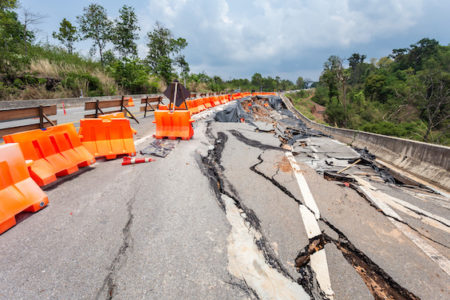Earthquakes come with or without warning, causing mass destruction and even death. If one were to hit, would you know what to do to stay safe? Would you know how to make life easier after a major quake? With the recent earthquakes in California and Nevada, we thought it would be smart to share some helpful tips that may save you or a loved one.
There are many resources out there on how to prepare for a disaster like this. Here is what the US Dept of Homeland Security says you should do in the event of an earthquake, starting with if you are inside:
-
- “Drop, Cover, then Hold On”: Drop to your hands and knees. Cover your head and neck with your arms to block any falling debris. Hold on to sturdy furniture or any other sturdy objects nearby until the shaking stops.
- If you are in bed, stay there and cover your head and neck with a pillow
- If you are inside, STAY inside
- If you are in a vehicle, get to a clear area away from trees, bridges, and any poles etc.
- If you are in a highrise building, do NOT use elevators
If you are outside during an earthquake, here is what you should do:
-
- Stay outside when an earthquake hits
- If you are by any ledges, slopes, or mountains, be on the lookout for landslides and falling rocks
- Stay away from trees and power-lines
Most importantly, be prepared before an earthquake even hits by having supplies and a plan ready.
-
- Create a family communications plan that has an out-of-state contact. Plan to meet somewhere if separated
- Practice “drop, cover and hold on” with family or coworkers
- Secure objects such as TVs and objects that hang on walls
- Prepare an emergency kit that has enough food and water for three days. The kit should include a flashlight, fire extinguisher, and whistle. Do not forget about the needs of pets. Consider specific needs such as meds. Always have extra batteries on hand.
Hopefully by knowing these tips you can stay safe during an earthquake. To learn more, you can read the complete Homeland Security earthquake page. If you’d like to learn more about training for your employees, check out the earthquake safety courses available in the OpenSesame catalog.
About the author: Parker Abena, a summer marketing intern at OpenSesame, is a senior at the University of Nebraska-Lincoln. He looks forward to moving out to PNW after school.






